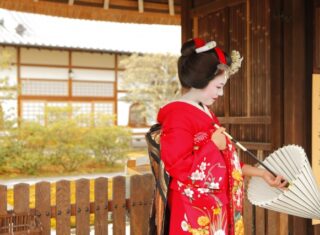- Learning Japanese
- From Zero to Fluent in Japanese
Understanding Modern Japanese Society Through Dramas – 5 Must-Watch Japanese Series
2025.06.25

Many Japanese learners have probably thought, “I want to learn about modern Japanese society through dramas!”
For those who don’t live in Japan, dramas offer one of the best ways to observe and understand how Japanese society works in real life, along with providing an excellent way to practice your listening skills.
In this article, we’ll explore the benefits of learning about Japanese society through TV dramas and introduce five recommended shows that reflect modern-day Japan.
We’ll also break down different aspects of society you can learn about through these dramas—so be sure to read on for inspiration and insights!
Benefits of Learning About Modern Japanese Society Through Dramas

Watching Japanese dramas offers three major benefits for those wanting to learn about modern society in Japan:
- Enjoyable storylines boost motivation to study
- You get to see realistic portrayals of everyday life in Japan
- You can learn not just about society, but also natural language and culture
- Excellent way to practice your listening skills
Let’s dive deeper into each of these advantages.
Enjoyable Storylines Boost Motivation to Learn
One of the biggest advantages of learning through Japanese dramas is that the stories are so engaging—they naturally increase your motivation to study.
Many dramas feature relatable main characters, and it’s easy to get emotionally invested in their journeys of growth and personal challenge.
With storylines full of laughter, tears, and drama, you’ll find yourself learning about modern Japanese society almost effortlessly—making this method perfect for those who find traditional study methods hard or dry.
See Realistic Portrayals of Everyday Life in Japan
Another benefit of Japanese dramas is their ability to show realistic, everyday scenes that reflect how Japanese society actually functions.
From business meetings, to workplace hierarchies, to casual conversations among school friends, dramas present a wide range of relatable, real-life situations.
Even if you’re far from Japan, watching dramas lets you observe daily social interactions in a natural context—making it an efficient and accessible way to study both language and culture.
Learn Not Just About Society—But Also Language and Culture
Using Japanese dramas as a study tool allows you to learn more than just social structure—you’ll also absorb natural Japanese conversation and cultural practices.
Because characters interact in many different situations, relationships, and topics, you’ll be exposed to everyday expressions that reflect real-life communication.
Many dramas also depict aspects of Japanese culture, from seasonal traditions and meals to crafts and customs—making them a fantastic resource for anyone wanting to deepen their understanding of Japan as a whole.
Excellent way to practice your listening skills
Japanese dramas expose you to natural, real-world speech—complete with slang, emotion, tone shifts, and conversational pacing. Unlike textbook recordings, the dialogue in dramas reflects how people actually speak, helping your ears adjust to everyday Japanese. Over time, this repeated exposure improves your listening comprehension, builds vocabulary in context, and helps you recognize key patterns in grammar and pronunciation without even realizing it.
What Can You Learn About Modern Japanese Society Through Dramas?

Japanese dramas offer insight into various areas of modern society. In particular, they provide a window into these four key aspects:
- Workplace relationships
- Modern views on love and dating
- Japan’s education system
- Specialized industries such as finance, healthcare, and agriculture
Let’s take a closer look at each of these themes and what you can learn from them.
Workplace Relationships
One major aspect of modern Japanese society portrayed in dramas is workplace relationships.
Through various settings—corporate offices, small businesses, start-ups—you’ll see how Japanese companies operate and how people relate to one another at work, including relationships between bosses and subordinates, or between peers and seniors/juniors.
Dramas also shed light on deeper social issues, such as long working hours, wage disparities, and power harassment (pawa-hara)—giving viewers a clearer picture of both the structure and the challenges of Japanese work culture.
Modern Views on Love and Dating
Japanese dramas also provide valuable insights into modern romance in Japan.
Themes often include balancing love and career, falling in love while living in a share house, or finding love through matchmaking apps and dating events—all reflective of the changing ways people connect in today’s society.
Thanks to a wide range of characters and situations, viewers can explore many different relationship dynamics and develop a deeper understanding of how love and dating are viewed in contemporary Japan.
Japan’s Education System
Japanese dramas can also help you understand how the education system works in modern Japan.
You’ll see depictions of classroom lessons, after-school club activities, and the intense university entrance exam culture—making these shows especially helpful for anyone considering studying in Japan.
Many dramas also explore deeper societal issues like school refusal, bullying, overworked teachers, and even “monster parents” (those who place excessive demands on teachers)—offering a realistic look into the challenges facing Japan’s education system today.
Specialized Fields: Finance, Healthcare, Agriculture, and More
Many Japanese dramas center around specific professional fields, offering a deep look into areas like finance, healthcare, and agriculture.
These series often follow characters working in a particular industry, such as banking, manufacturing, advertising, real estate, or food service—giving viewers the chance to explore a wide variety of work environments and social structures.
There are also many dramas that spotlight Japan’s competitive sports culture, including baseball, pro wrestling, table tennis, and go (Japanese chess)—each one providing a fresh lens on different facets of Japanese life.
★Also try reading:
Deepen Your Understanding of Japanese Culture and Traditions! A Detailed Guide to 12 Iconic Traditions
5 Japanese Dramas That Offer Insight into Modern Society

Here are five carefully selected Japanese dramas that offer meaningful insight into contemporary Japanese life and work culture:
- Haken no Hinkaku ("The Pride of the Temp")
- Shitamachi Rocket
- Watashi, Teiji de Kaerimasu ("I Will Not Work Overtime, Period")
- Dragon Zakura
- Genkai Shūraku Kabushikigaisha ("The Remote Village Company")
Let’s take a closer look at each of these shows.
Haken no Hinkaku (The Pride of the Temp)
Haken no Hinkaku is a socially conscious workplace drama centered around the fiercely independent and highly competent temp worker, Haruko Ōmae. Set in a large corporate office, the show explores the often unspoken tension between full-time employees and temporary staff—sometimes with raw honesty, sometimes with humor (this drama is really hilarious, honestly one of our favorites).
Haruko, the main character, stands out for her intense professionalism, pride in her work, and refusal to bow to anyone. Her ability to flawlessly handle any task brings not only satisfaction to viewers but also sparks deeper questions like, “What does it mean to work with pride?” and “What is true professionalism?”
At the same time, the drama doesn’t shy away from portraying the harsh realities faced by temp workers—such as job insecurity, unfair treatment, and lack of recognition. Despite their contributions, temps often struggle with unstable contracts and limited career growth, making the drama a pointed reflection on modern labor conditions.
Haken no Hinkaku isn’t just entertainment—it delivers a strong, relevant message about dignity in the workplace.
Shitamachi Rocket
Shitamachi Rocket is an inspiring drama about a small-town factory in Japan that takes on massive obstacles—and even bigger dreams—as it fights its way toward participating in space development.
The main character, Kōhei Tsukuda, is a former space scientist who leaves academia to take over his father’s modest manufacturing business, Tsukuda Manufacturing. The story begins with the factory struggling under financial pressure and unjust treatment from large corporations.
But instead of giving up, Tsukuda and his team persevere—armed with passion for craftsmanship and unwavering pride in their work. Together, they confront each challenge head-on, refusing to let go of their vision.
What sets this drama apart is its respectful portrayal of Japan’s monozukuri spirit—the deep pride in making things well—and the often-overlooked power of small factories. It also highlights the unequal power dynamics between small businesses and corporate giants, encouraging viewers to reflect on the true meaning of work and professional dignity.
Shitamachi Rocket is a powerful and moving story that speaks to anyone trying to chase a dream while navigating the harsh realities of life.
Watashi, Teiji de Kaerimasu (I Will Not Work Overtime, Period)
This drama follows Yui Higashiyama, a woman who lives by one simple rule: “I leave the office on time.” She works efficiently, refuses to do unnecessary overtime, and heads home at the end of every workday—something that remains controversial in Japan’s long-hours work culture.
In a society where “working hard” often means staying late, Yui’s approach challenges the norm—and her quiet determination strikes a chord with many viewers.
Throughout the story, we meet characters who represent common workplace struggles: a workaholic boss, inefficient coworkers drowning in tasks, young employees wanting to quit, and a manager with a toxic leadership style. As Yui interacts with each of them, she’s forced to question and reaffirm her own values, growing along the way.
The drama also touches on Yui’s romantic life and the difficulty of balancing career and personal relationships, such as differing views on marriage and lifestyle.
Watashi, Teiji de Kaerimasu is a meaningful, eye-opening series for anyone who wants to rethink how they work and what it truly means to live—and work—on your own terms.
Dragon Zakura
Dragon Zakura is a high school drama that follows a struggling school on the verge of collapse, where a group of so-called “loser” students set their sights on the nearly impossible goal of getting into Tokyo University.
The lead character, Kenji Sakuragi, is a former delinquent turned lawyer who uses ruthless logic and no-nonsense strategies to teach the students not only how to pass exams, but why studying matters in the first place.
What makes this drama stand out is that it’s not just about test-taking techniques—it’s about purpose, growth, and how education can open doors to a different future. As the students face personal and academic challenges, they slowly learn to believe in themselves and each other.
The show also dives into broader social issues, such as family dynamics, educational inequality, and the inner workings of school management, making it especially impactful for parents, educators, and anyone interested in Japan’s school system.
Dragon Zakura is an inspiring, emotionally charged series that reminds us of the power of learning, the importance of dreams, and the strength found in believing in yourself and others.
Genkai Shūraku Kabushikigaisha (The Remote Village Company)
Genkai Shūraku Kabushikigaisha is a heartfelt drama set in a rural farming village grappling with depopulation and an aging population. It tells the story of a community's fight to breathe new life into their hometown.
The setting is a “genkai shūraku”—a remote area on the verge of extinction, where young people have moved away to the cities and only elderly farmers remain. Enter Yū Takigawa, a former elite trading company employee, who takes on the challenge of revitalizing local agriculture as a sustainable business.
Although initially met with resistance from the villagers, Takigawa gradually earns their trust and works alongside them to rebrand local produce, improve distribution systems, and rethink what rural success could look like.
This drama poses important questions like: What does true regional revitalization mean? and What should a sustainable society look like?
More than just a story about farming, it’s a moving tale that reminds us that it’s never too late to start over, and that one person’s vision can spark community-wide transformation.
★Also try reading:
Best Way to Learn Japanese in 2025
Conclusion: Understanding Modern Japanese Society Through Dramas

Japanese dramas are an excellent tool for anyone who wants to learn more about Japan. They combine entertaining storylines with realistic portrayals of society, and also offer opportunities to study both the Japanese language and culture.
If watching Japanese dramas has inspired you to learn practical Japanese and gain a deeper understanding of the culture behind the stories, why not try an online lesson at Oku Sensei’s Japanese?
At Oku Sensei’s Japanese, you’ll enjoy fun, effective lessons designed to help you master real-world Japanese—while also learning about the cultural context behind the language.
And right now, we’re offering a free 30-minute consultation, so be sure to check it out!
-
Before article

From Zero to Fluent in Japanese: The True Story of How I Mastered Japanese and Changed My Life - Part 5: Walking the Fire – Where Words Fail – and Growth Begins
-
Next article
From Zero to Fluent in Japanese: The True Story of How I Mastered Japanese and Changed My Life - Part 7: The Birth of OSJ – Through Trial and Ink

















